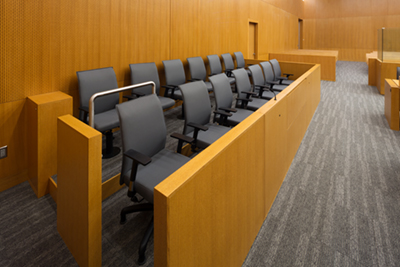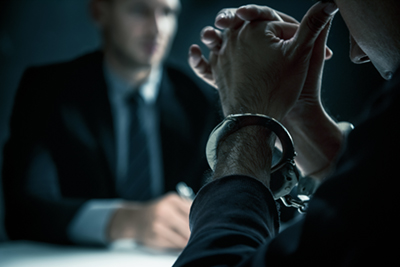Simply put, speech privacy is the inability of an unintended listener to understand another person’s conversation. Sound masking systems improve speech privacy through the use of an unobtrusive background sound that is not unlike airflow from the HVAC system. It is delivered by an electronic grid of speakers either in the ceiling or beneath the raised floor. Sound masking specifically targets the frequency range of typical human speech and increases speech privacy by reducing intelligibility to the degree that speech is only heard by intended listeners.
In legal environments, speech privacy is critical in maintaining confidentiality. All lobbies and corridors need sound masking to prevent reception of unintended speech. Sound masking can reduce the risk and possible danger of overheard words. An additional benefit of sound masking is the reduction of distractions in the workplace which will increase focus and productivity.
Law Firm Offices
 Law firms require the ability to have confidential conversations in nearly every square foot of their building. This includes small offices, meeting rooms, surrounding corridors, and lobbies. Even when private offices have floor to deck wall and heavy doors, this is commonly not enough to guarantee 100% privacy. Some construction techniques and building materials can reduce sound transmission, but gaps under doors, metal window frames (mullions), HVAC ducts, and plenums will allow speech transmission between these spaces.
Law firms require the ability to have confidential conversations in nearly every square foot of their building. This includes small offices, meeting rooms, surrounding corridors, and lobbies. Even when private offices have floor to deck wall and heavy doors, this is commonly not enough to guarantee 100% privacy. Some construction techniques and building materials can reduce sound transmission, but gaps under doors, metal window frames (mullions), HVAC ducts, and plenums will allow speech transmission between these spaces.
Courthouses
 Some of societies most confidential conversations take place in courthouses. Jury deliberation areas cannot afford to lack speech privacy in either direction. Just as jurors need their conversations to “stay in the room,” they should likewise not be able to overhear any conversations from outside areas. Bench meetings and sidebar discussions during courtroom proceedings are made private when masking is used at the areas where the jury and audience are located. Judges are typically given a switch that will turn the masking on while also muting all microphones.
Some of societies most confidential conversations take place in courthouses. Jury deliberation areas cannot afford to lack speech privacy in either direction. Just as jurors need their conversations to “stay in the room,” they should likewise not be able to overhear any conversations from outside areas. Bench meetings and sidebar discussions during courtroom proceedings are made private when masking is used at the areas where the jury and audience are located. Judges are typically given a switch that will turn the masking on while also muting all microphones.
Law Enforcement & Correctional Facilities
 These facilities are host to conversations that must be private. Meetings between lawyers and clients must remain confidential. Interrogation rooms need an “acoustic seal” around them when close to lobbies and corridors. While suspects need privacy when in holding rooms, witnesses are more likely to share information with law enforcement when they know they have speech privacy. Other areas that require confidentiality are administrative in nature. Payroll, HR, and office areas all require speech privacy throughout the day. Police stations, correctional facilities, and other municipal, county, state, and federal facilities will benefit from sound masking.
These facilities are host to conversations that must be private. Meetings between lawyers and clients must remain confidential. Interrogation rooms need an “acoustic seal” around them when close to lobbies and corridors. While suspects need privacy when in holding rooms, witnesses are more likely to share information with law enforcement when they know they have speech privacy. Other areas that require confidentiality are administrative in nature. Payroll, HR, and office areas all require speech privacy throughout the day. Police stations, correctional facilities, and other municipal, county, state, and federal facilities will benefit from sound masking.
AtlasIED Speech Privacy Solutions
AtlasIED has a solution for every space. Our design team works with certified installers to make our solution an easy choice to increase privacy, reduce distractions, increase productivity, reduce building material costs during construction/remodeling, and make all speech intentional.
For other sound masking related blog articles, CLICK HERE.


